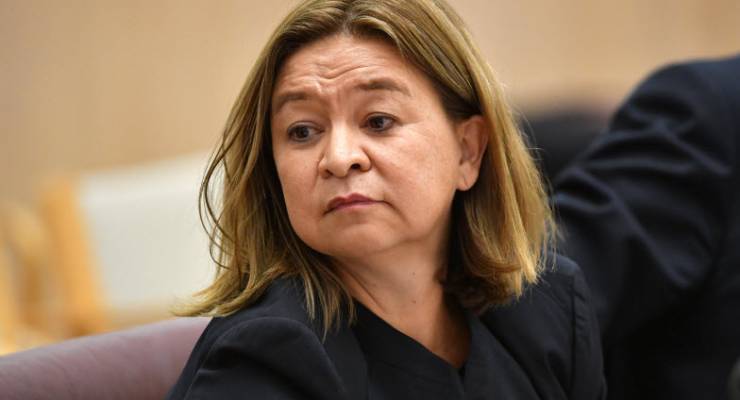
ABC managing director Michelle Guthrie doesn’t think the public broadcaster should be subject to local content quotas because it’s already required to tell Australian stories.
“As the ABC, we’re really there to serve all Australians. The Australian-ness is what distinguishes us. For us it’s really important to respond to our audience,” she said.
Guthrie was speaking on a panel on the economics of creating content at the Australian Content Conversation conference yesterday, alongside other industry heavyweights.
Her comments are in contrast to those of former ABC head of TV Kim Dalton, who said this morning in a speech the ABC should be subject to local content requirements.
Dalton was to argue that the ABC had “lost its way”, and “has demonstrated it cannot be trusted or relied upon to prioritise its engagement with Australian content,” according to The Australian.
The speech follows an essay Dalton published earlier this month, in which he called for more accountability at the ABC for how it allocates funding to content, as well as quotas on local and children’s content.
Veteran Australian TV producer John Edwards, who is responsible for hits across a number of networks (including the ABC) such as Offspring, Puberty Blues and The Secret Life of Us, also spoke at the conference yesterday.
Edwards said he had no doubt that some of the 38 shows he’s produced would never have been made if not for local content requirements. He said that while two of the three commercial free-to-air networks struggled to meet the local content quotas, he thinks the rule is “terribly important” for the industry.
“The very fact that networks are required to make a certain amount is the single thing that’s caused our industry to survive,” he said. “The most successful shows I’ve made weren’t necessarily the ones that were wanted to be made by the networks.”
Guthrie also said we could expect to see more collaborations between production companies, such as with the ABC’s Cleverman — produced by an Australian and a New Zealand production company.
“For Cleverman, the production cost is very high. It’s bringing Australians to a global audience, and without that collaboration it wouldn’t have been made,” Guthrie said. “That higher end of the production market is going to get tougher to do alone, and to think we can produce that high end quality on our own is foolish.”
Channel Ten’s chief programming officer Beverley McGarvey was also on the panel, and said the free to air networks were struggling to keep up in the increasingly fragmented market where the gap between returns and the cost of commissioning and acquiring content is closing. That’s even when it’s often the local content that provides the ratings. Add to that the competition from online streaming services such as Netflix and Stan, which don’t have the same local content obligations.
“What we’d like is for that space to be an even playing field in terms of obligations,” McGarvey said.
She also said it was getting increasingly difficult for the networks to justify spending on content. “Increasingly, you like the project and the business case doesn’t stack up,” she said. “Sometimes you hear an idea and think, ‘I can’t afford to make that’. We haven’t quite caught up to manage that.”
Endemol Shine commercial director Scott Howard, speaking on a second panel yesterday, said there’s just not enough money in Australia to support the shows producers wanted to make without collaborating.
“In drama, there’s a massive drain in talent because the US is stealing writers and directors from the UK, so the UK is stealing writers and directors from Australia. We should be right in the middle but instead we’re losing the battle because we don’t have the funds to pay for the content people want to watch.”
Ten announced doubt over its future to the ASX late last month — if it does not secure $250 million of new loans, it will not be able to meet its existing debts.
The panels were in agreement that further government subsidies would help to produce more local content. Edwards said any subsidies for local production were in part paid back to the government in payroll tax.
The government announced it would cut licence fees for broadcasters in the federal budget last week, something the networks have been asking for for years.








Local content rules depends on what Rupert expects / demands.
This argument about local content rules has been going on for a long time with the commercial stations opposing them at every turn.
Reading Dalton on the ABC is a laugh. He closed down the Natural History unit, which at the time was one of the most productive and successful parts of the ABC and also brought in money from international partners. They were respected around the world.
What is needed is a thorough assessment of all the platforms that make up broad and narrowcasting with a plan that best supports both quality local productions and audiences.
Let’s stop pretending that the world hasn’t changed and properly fund our national broadcasters to live up to their charters.
And keep Rupert away from all of it.
The second action of a new Labor government should be the ignominious sacking of Guthrie preceded immediately by those who employed her to apply the coup de grace to the ABC.
Yeah, I know.. they can’t and won’t … but still, it would be justice.
One wonders if Guthrie is still on retainer to do the mudorc’s bidding to undermine & destroy the ABC.
A mole?